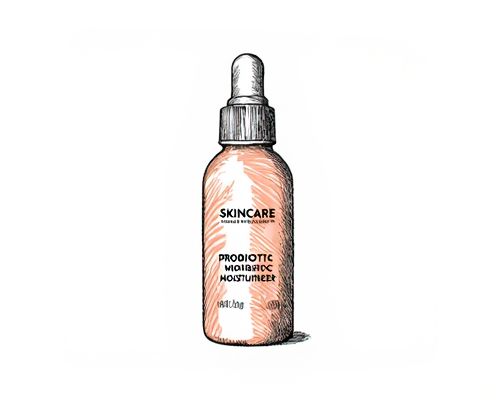
Probiotic moisturizer Illustration
Probiotic moisturizers enhance skin health by balancing the natural microbiome and reducing inflammation. These formulations support hydration and strengthen the skin barrier, promoting a radiant and resilient complexion. Consistent use helps protect against environmental stressors and improves overall skin texture.
Understanding Probiotics in Skincare
Probiotic moisturizers leverage beneficial bacteria strains such as Lactobacillus and Bifidobacterium to restore the skin's natural microbiome balance, enhancing barrier function and reducing inflammation. These formulations promote hydration by supporting the skin's ability to retain moisture and protect against irritants and environmental aggressors. Incorporating probiotics in skincare helps fortify the skin's defense mechanisms, improving overall texture and resilience.
Key Benefits of Probiotic Moisturizers for Women
Probiotic moisturizers enhance the skin's natural barrier by promoting a balanced microbiome, resulting in improved hydration and reduced sensitivity. These formulations help combat inflammation and redness, supporting clearer, healthier skin for women prone to acne or rosacea. Regular use boosts skin resilience against environmental stressors, leading to a more radiant and youthful complexion.
How Probiotic Moisturizers Support Skin Health
Probiotic moisturizers support skin health by balancing the natural microbiome, enhancing the skin's barrier function and reducing inflammation. These formulations promote beneficial bacteria growth, which protects against harmful pathogens and helps maintain optimal hydration levels. Studies show regular use of probiotic moisturizers can improve skin texture, reduce redness, and alleviate conditions such as acne and eczema.
Essential Ingredients in Probiotic Skincare Products
Probiotic moisturizers contain essential ingredients such as live beneficial bacteria strains like Lactobacillus and Bifidobacterium, which help restore the skin's natural microbial balance. Key components include prebiotics like inulin and fructooligosaccharides that nourish these probiotics, alongside hydrating agents such as hyaluronic acid and ceramides to strengthen the skin barrier. Formulations often incorporate antioxidants like vitamin E and green tea extract to reduce inflammation and support overall skin health.
Choosing the Right Probiotic Moisturizer for Your Skin Type
Selecting the right probiotic moisturizer for your skin type involves understanding how different formulations target specific concerns like dryness, acne, or sensitivity. Look for products containing beneficial strains such as Lactobacillus or Bifidobacterium, which help balance your skin's microbiome while delivering hydration and repair. Your choice should also consider texture and additional ingredients to ensure compatibility with your skin's unique needs and enhance overall complexion health.
Step-by-Step Guide: How to Apply Probiotic Moisturizer
Start by thoroughly cleansing your face with a gentle cleanser to remove impurities and prepare your skin for better absorption. Dispense a pea-sized amount of probiotic moisturizer onto your fingertips and gently dab it onto your forehead, cheeks, nose, and chin. Use upward, circular motions to evenly spread the moisturizer, allowing the probiotics to nurture your skin's microbiome and enhance hydration.
Probiotic Moisturizer vs. Traditional Moisturizer
Probiotic moisturizers enhance skin barrier function by introducing beneficial bacteria, promoting microbiome balance and reducing inflammation compared to traditional moisturizers that primarily provide hydration without microbial benefits. These advanced formulations often contain strains like Lactobacillus and Bifidobacterium, which support natural defenses and improve skin resilience. Traditional moisturizers rely on emollients and humectants, lacking the targeted prebiotic and probiotic ingredients that actively restore skin health.
Addressing Common Skin Concerns with Probiotic Skincare
Probiotic moisturizers harness beneficial bacteria to balance your skin's microbiome, reducing inflammation and dryness often linked to acne and sensitivity. These formulations strengthen the skin barrier, helping to combat redness, irritation, and aging signs by promoting natural hydration and healing. Incorporating probiotics in your skincare routine can enhance overall skin resilience and radiance, addressing common concerns with gentle, effective care.
Expert Tips to Maximize Probiotic Moisturizer Results
To maximize the benefits of your probiotic moisturizer, apply it to clean, slightly damp skin to enhance absorption and support the skin's natural microbiome. Incorporate gentle cleansing routines and avoid harsh exfoliants that can disrupt probiotic efficacy. Consistent use alongside a balanced diet rich in prebiotics can further strengthen your skin's barrier and promote a radiant complexion.
Frequently Asked Questions about Probiotic Moisturizers
Probiotic moisturizers enhance skin health by balancing the microbiome and reducing inflammation, making them ideal for sensitive and acne-prone skin. Common questions include how often to apply, with dermatologists recommending daily use for optimal benefits and improved hydration. Users also inquire about safety, and research confirms probiotic ingredients are generally well-tolerated, posing minimal risk of irritation or allergic reactions.
 womendy.com
womendy.com